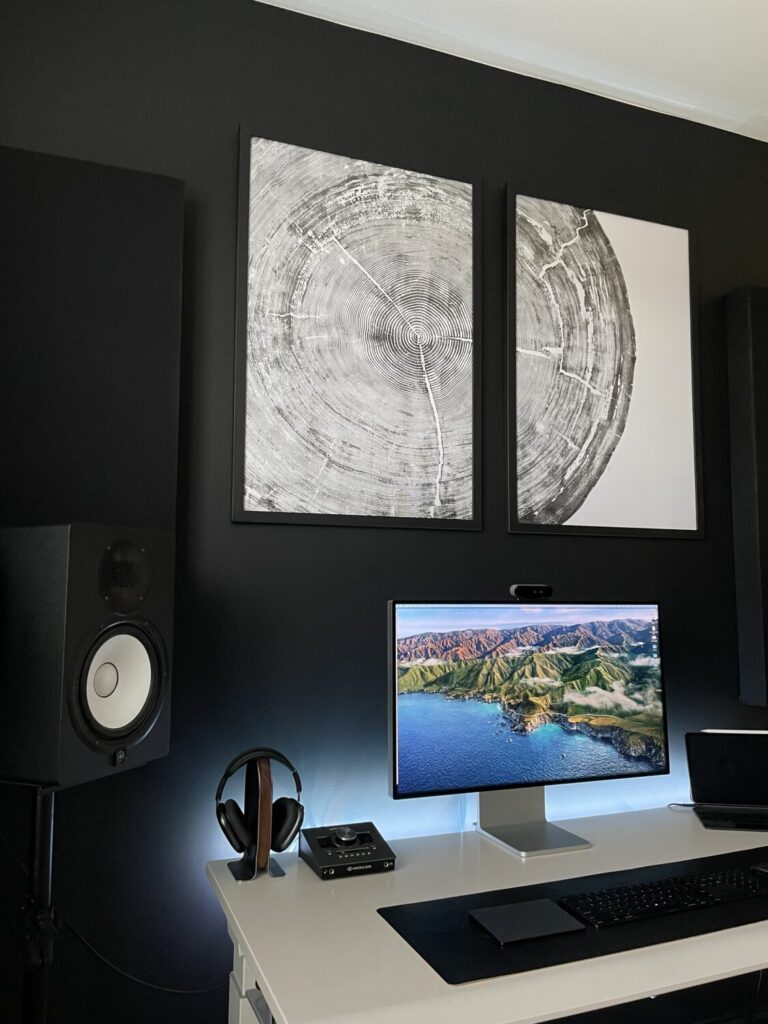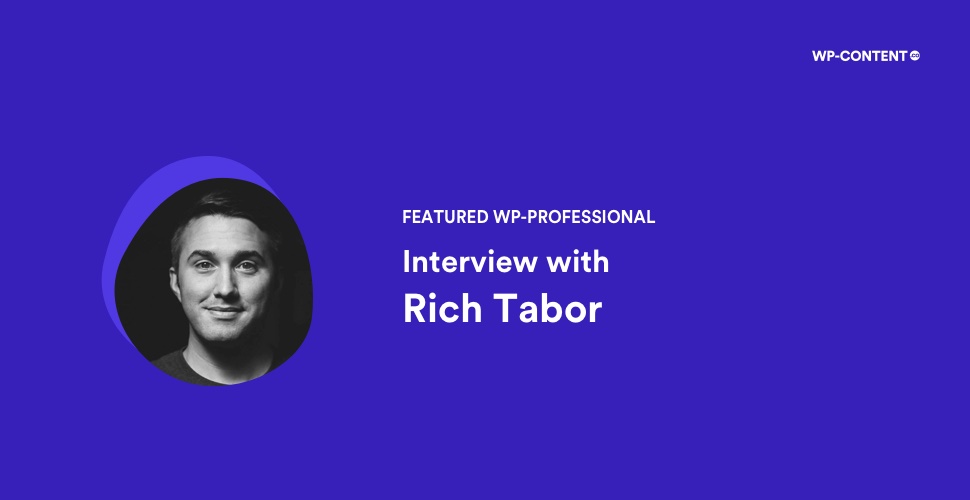In this episode of the WP-Professional of the Month series, we introduce Rich Tabor. Rich Tabor is one of the most popular names in WordPress, especially among Gutenberg contributors and acquisition stakeholders.

His ever-precise design chops have topped the 2018 Automattic Design Awards. He co-founded CoBlocks (a top-notch set of page builder blocks and tools for Gutenberg), ThemeBeans (a premier WordPress theme shop) and Iceberg (a markdown editor for Gutenberg).
He is currently the Head of Product at Extendify. You can find him on Twitter, GitHub and his blog.
You are an Entrepreneur, Designer, Developer, Product Head & a Blogger. How did the journey start? How did you get introduced to WordPress?
I was introduced to WordPress as a designer for a local web agency when I first graduated college. I started designing landing pages and such, but I wanted to understand exactly what I was designing for. So I leaned into WordPress and the world of themes.
Then, I started designing, building and launching premium WordPress themes, and a few years later I caught the Gutenberg wave and built a few blocks. I sold both the themes and the blocks to GoDaddy and joined as the Senior Product Manager of WordPress Experience for a couple of years as well. And recently I joined Extendify to lead their products section.
So yea, I’m all in on WordPress.
Where are you based? Does your location influence your work?

I’m based near Atlanta, Georgia in the United States. I’ve been in this general location for the past ten years or so, so it hasn’t impacted my work. I really love the weather, the people and I’m close to family — which I value immensely.
Please share some projects you are currently involved with
So I’m leading product at Extendify, where we’re building alongside the innovative Gutenberg front of WordPress, pushing out a truly second-to-none library of block patterns. It’s a fantastic environment and a welcome challenge to head.
WordPress as a whole is shifting towards a block editor first environment, and I want to keep leading that shift.
I also have side gigs I’ve done, mostly to learn and grow. I like challenges and putting stuff out there for folks to use in a real-world environment forces me to level up. Currently, I have Iceberg, a markdown block editor for WordPress, and Wabi a new block theme for writers and publishers.
You have several themes to your name. What is your development process? Do you just turn your ideas into realities or is it an answer to the market demand?

Nine times out of ten I have an idea that I want to see to fruition simply because it’s challenging and pushes WordPress forward. And most of those ideas support what I want to accomplish myself.
For example, I wanted to make writing easier in WordPress, because I write in WordPress — so I built Iceberg. And I wanted to make a shiny new blog theme for myself, but thought it’d be a great place to introduce folks to Full Site Editing — so I built Wabi.
You have a lot of experience with Gutenberg. Why do you think people are still reluctant to adopt it?
Gutenberg is a huge change. For everyone, not just developers — and not just users. When the block editor first rolled out, it wasn’t meant to replace the mature page builder ecosystem that grew out of WordPress. It was meant to turn the tide of the WordPress ecosystem as a whole in a direction that empowered WordPress users more than ever before.
Honestly, Full Site Editing is the real deal when it comes to Block editing. Gutenberg laid the block editing framework — arguably clumsily — but this new push into block themes, theme.json, site editing, template editing, etc takes the block editor to a whole new level… a level where it actually could become more adopted by WordPress professionals. I have no doubt we’ll see that curve upwards this year.
You hear a lot of murmurs now about FSE and the beginning of the death of themes. What do you think? Is there still scope for new entrants into this field?
Over the years I’ve been back and forth about the forthcoming doom of WordPress themes in regards to Gutenberg, but I’m pretty confident that we’re not seeing the end of themes. Perhaps the end of themes as we know them today — but not themes as they’re becoming i.e. block themes.
Block themes are game-changers. They’re honestly a starting point for sites; a collection of components that establish a site — all of which the site implementor may modify. It’s a powerful concept that we’re finally seeing in the real world WordPress 5.9, and I believe they will be the catalyst for widespread Gutenberg adoption.
What makes WordPress so special to you?
WordPress is more than a five-second install, or fancy themes and plugins, or a quickly maturing block editor. WordPress is a tool that empowers you to share and publish online and is 100% yours.
I believe in open source — it’s incredibly empowering and personally rewarding to be involved with the project.
What is your favorite a) plugin b) Theme c) Hosting and why? (Please mention products other than your own)
It’s tough picking a favorite theme, but I’d have to go with Bricksy or Avant-Grade.
As for plugins, I change my favorite block plugin regularly, but lately, I’ve been installing the Social Sharing Block on my sites.
Hosting would be GoDaddy – I’m quite biased because I know the team behind the scenes and I know they’re amazing.
What do you think about the future of WordPress and Gutenberg?
I think it’s going to be great. Full Site Editing is just kicking off, but we’re already seeing massive strides in how the theme and the block editor interplay, as well as how people can create beautiful websites without a line of code.
What would you like to see implemented to WordPress as a Core feature?
I have a list of GitHub issues around the Gutenberg project, but ultimately if we push harder on the experience front of the block and site editors, we’ll be moving in the right direction. The foundation is there; the experience is arguably not quite.
We had so many acquisitions in WordPress in recent times. As a person with experience, what do you think? Any tips for authors on how and when to sell off their projects?
Build what you enjoy building. Work together with others. Don’t focus on the little things, but make the experience second-to-none by a long shot. If you can 10x something, do it.
Life has both success and failure. Please share one mistake that you made earlier in your career.
One thing that prevented my personal and professional growth at the beginning of my career is not partnering more often with others. Since then, I’ve learned so much by partnering with other designers and developers and joining a mastermind group. There’s no way I’d be where I’m at today if I hadn’t shifted towards a mindset of partnering, and ultimately, learning from others.
What is Rich like away from WordPress? What are your ways of chilling?
I enjoy grilling out with wings and margaritas, then heading down to the local pond to fish and hang out with my family and friends. I also enjoy playing/writing music.
The WP-Content team wishes all the very best for his future endeavors and hopes to see him make more contributions to WordPress.
Meet our previous WP-Professionals of the Month – Lesley Sim, Mark Zahra, Chris Lema, Miriam Schwab, Justin Tadlock,


